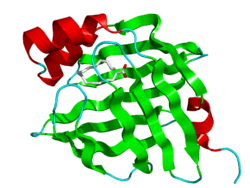adipocyte protein 2
| View/Edit Human | View/Edit Mouse |
aP2 (adipocyte Protein 2)[3] is a carrier protein for fatty acids that is primarily expressed in adipocytes and macrophages. aP2 is also called fatty acid binding protein 4 (FABP4). Blocking this protein either through genetic engineering or drugs[4][5] has the possibility of treating heart disease,[6] diabetes,[7] asthma,[8] obesity,[9] and fatty liver disease.[10]
See also
References
- ↑ "Human PubMed Reference:".
- ↑ "Mouse PubMed Reference:".
- ↑ Baxa CA, Sha RS, Buelt MK, Smith AJ, Matarese V, Chinander LL, Boundy KL, Bernlohr DA (1989). "Human adipocyte lipid-binding protein: purification of the protein and cloning of its complementary DNA". Biochemistry. 28 (22): 8683–90. doi:10.1021/bi00448a003. PMID 2481498.
- ↑ Forbes health article July 14, 2006
- ↑ Medicinenet.com
- ↑ Makowski L, Boord JB, Maeda K, Babaev VR, Uysal KT, Morgan MA, Parker RA, Suttles J, Fazio S, Hotamisligil GS, Linton MF (2001). "Lack of macrophage fatty-acid-binding protein aP2 protects mice deficient in apolipoprotein E against atherosclerosis". Nat. Med. 7 (6): 699–705. doi:10.1038/89076. PMID 11385507.
- ↑ Furuhashi M, Tuncman G, Görgün CZ, Makowski L, Atsumi G, Vaillancourt E, Kono K, Babaev VR, Fazio S, Linton MF, Sulsky R, Robl JA, Parker RA, Hotamisligil GS (2007). "Treatment of diabetes and atherosclerosis by inhibiting fatty-acid-binding protein aP2". Nature. 447 (7147): 959–65. doi:10.1038/nature05844. PMID 17554340.
- ↑ Shum BO, Mackay CR, Gorgun CZ, Frost MJ, Kumar RK, Hotamisligil GS, Rolph MS (2006). "The adipocyte fatty acid-binding protein aP2 is required in allergic airway inflammation". J. Clin. Invest. 116 (8): 2183–2192. doi:10.1172/JCI24767. PMC 1501108
 . PMID 16841093.
. PMID 16841093. - ↑ Maeda K, Cao H, Kono K, Gorgun CZ, Furuhashi M, Uysal KT, Cao Q, Atsumi G, Malone H, Krishnan B, Minokoshi Y, Kahn BB, Parker RA, Hotamisligil GS (2005). "Adipocyte/macrophage fatty acid binding proteins control integrated metabolic responses in obesity and diabetes". Cell Metab. 1 (2): 107–19. doi:10.1016/j.cmet.2004.12.008. PMID 16054052.
- ↑ Makowski L, Hotamisligil GS (2005). "The role of fatty acid binding proteins in metabolic syndrome and atherosclerosis". Curr. Opin. Lipidol. 16 (5): 543–8. doi:10.1097/01.mol.0000180166.08196.07. PMID 16148539.
External links
- FABP4 protein, human at the US National Library of Medicine Medical Subject Headings (MeSH)
This article is issued from Wikipedia - version of the 5/19/2016. The text is available under the Creative Commons Attribution/Share Alike but additional terms may apply for the media files.
